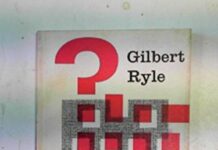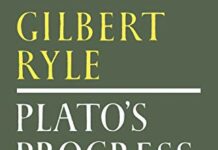
Ebook Info
- Published: 2020
- Number of pages: 418 pages
- Format: PDF
- File Size: 1.53 MB
- Authors: Gilbert Ryle
Description
The Concept of Mind is a 1949 book by the philosopher Gilbert Ryle, in which the author argues that “mind” is “a philosophical illusion hailing chiefly from René Descartes and sustained by logical errors and ‘category mistakes’ which have become habitual.” The work has been cited as having “put the final nail in the coffin of Cartesian dualism” and has been seen as a founding document in the philosophy of mind, which received professional recognition as a distinct and important branch of philosophy only after 1950.—Print ed.
User’s Reviews
Reviews from Amazon users which were colected at the time this book was published on the website:
⭐I have read several contemporary materialist philosophers assert there is no need to even bother discussing dualism, as Ryle so effectively refuted it in this work. They provided no SUMMARIES of this decisive refutation, which is often a hint there is less there than they claim.And that is what I found when I finally checked Ryle out himself.Ryle is a good polemicist and sloganeer. He presents a huge number of analogies to help readers to find his claims more plausible. He ridicules Cartesian dualism, and throws out a lot of catchy slogans: it is a “category mistake”, it is an “occult” hypothesis, and it is ultimately a claim we are a“Ghost in a machine”. Argument by analogy carries NO evidential weight, and sloganeering and ridicule are the tools of the political polemicist and religious Apologist – they are intended to distract from and make up for flaws in a reasoned case against a POV. That these non-rational, non-evidential arguments play such a central role in Ryle’s writing is a further strong hint that there may not be any actual refutation behind these claims to have refuted dualism.So what case did he actually try to make? There are four primary charges he levels at Cartesian dualism:1. That the ascribing of perfect knowledge to one’s own thoughts, and inability to access other’s thoughts, results in a posture of uncertainly that others are even conscious or reasoning, and this is an absurd conclusion to reach, therefore its absurdity refutes the premises of Cartesian dualism that lead to it.2. Cartesian dualism requires that all actions involve a phase of “thinking about” the upcoming action, and this requirement creates an infinite regress of thinking about the thinking about etc, and is therefore incoherent.3. Since in Cartesian dualism the ascribing of attitudes and thoughts to others refers to an interior life that by definition one cannot access, and have no certainty even exists, and the effective use of such terms requires confidence that the referents exist, one cannot, in Cartesian terms, actually refer to the inner life and attitudes of others.4. In actuality, the use of terms such as “witty” etc are not descriptors of inner experiences, but of the behavior that is externally observable.Discussing each point in turn:1) Assuming a conclusion is a fallacy in science and reasoning. Whether we can know or not the presence of another mind, or only infer it without certainty, is a question to INVESTIGATE, not ASSUME TO BE TRUE, as Ryle does here. It is entirely legitimate to conclude a circumstance of ignorance of other’s rationality and consciousness. Ryle’s point 1 above is a fallacy of assuming a conclusion.2) Ryle makes a number of absolute and “must consist of” assertions about Cartesian Dualism, which are not at all obviously true. But his critiques depend on these absolutes being absolutes, as with this one here. If it is just GENERALLY, or merely OFTEN true that one thinks about a theory prior to performing an action, and from my experience this is the case, then there is no regress, and this ”falsification” is invalid. When one asserts that a POV one is attacking has a claim that it does not have, this is another fallacy, that of straw manning.3) Ryle’s claim in argument 3 that one must have absolute confidence in the existence of something before one can effectively apply properties to that thing and use it effectively in sentences, is absurdly wrong. Every fiction writer refutes this claim. Every dreamer. Every act of imagination. And every process of defining scientific hypothesis, and deriving consequences to test does as well. His claim 3 is simply a falsehood, and one that even the simplest of self-reflection should have shown him to be false.4) The process of developing hypotheses about the world IS to postulate more fundamental realities, and not limit oneself to merely describing the observations one bases those observations on. Ryle’s claim that language about dispositions, etc, does not refer to hypotheses involving minds, but instead merely to the cumulative evidence of observations of behavior, is blatantly untrue, and is refuted by any investigation of how we humans conduct empiricism, and is in explicit conflict with the process of scientific hypothesis forming. In his effort to deny the reality of minds, Ryle is rejecting the scientific process.So, NONE of these critiques that are the central arguments Ryle makes are valid.Additionally, Ryle repeatedly refers to perceptions, internal experiences, and silent reasoning processes that ARE only accessible to an individual – ie he admits to non-behavior-based mind events. And sometimes in the very next paragraph repeats his claims that mind-speak is only about externally observed behavior! Not only were his attacks on dualism all falsehoods and fallacies, but his own writing and thinking suffers from a massive internal contradiction that he is apparently unaware of.If this is the “definitive” refutation of Cartesian dualism, then Cartesian dualism has nothing to fear from its materialist critics.
⭐The problem with this book is also the problem of philosophy in general: it lacks foundation in the material world. Reading Ryle’s rebuttal of what he terms The Official Doctrine is like reading the work of a medieval theologian. We are in the clouds, discussing at the wrong level of abstraction the emergent properties of phenomenon that need to be examined in a completely different way if they are to be understood.Philosophers, being utterly disconnected from tangible scientific investigation, tend to wander around in an abstract maze wondering why they can never touch the boundaries and work out where they are. A major problem is that they lack any practical understanding of how things really work. It is as if philosophers were to spend a thousand years discussing the “reality” of a Boeing 747 without ever once studying aerodynamics or propulsion mechanics or even getting onto a scheduled flight.In Ryle’s book the usual mistakes are recapitulated: mind is thought of as a total, rather than as a series of fairly discrete phenomenon. We experience ourselves as “whole” but this is an illusion. The illusion has been demonstrated multiple times over the last fifty years but people (including philosophers) are deeply reluctant to take this on board. The problem with Ryle’s work is that he lacks all mechanical knowledge of how the brain creates the illusion of “mind” and therefore he is utterly unable to make any real progress in his discussion of it. We know that what we used to call “mind” is actually a complex series of interactions, built up in layers. First we have reflex, which is hard-wired. Thus we experience a massive adrenaline rush when suddenly exposed to unexpected shock (this is the basis of flight-or-fight). Then we have instinct, which is fairly hard-coded but can under certain circumstances be modified or rewired. Language acquisition is an example of instinct. After this we have emotion, which is controlled by our endocrine system. Most human behavior, it seems, is driven by a mixture of instinct and emotion. Lastly we have reason, but this is probably the least developed part of our brain and we flatter ourselves by imagining it to be the dominant card in the deck. A cursory glance at history serves to reveal how very small a role reason plays in the course of human events. Reason exists predominantly in the frontal lobes.Treating these very different mental strata as though they were indivisible and equivalent is of course an error from which philosophy cannot recover. Like a logical proposition that commences from a false statement, the scaffolding is build on air and must therefore collapse no matter how elaborate the construction and no matter how great an effort is applied.For people who enjoy reading medieval theology (how many angels can in fact dance on the head of a pin?) this book will provide charm and amusement. But for anyone wanting to know anything factual about the illusion of mind generated by the human brain, this book contains nothing but the dust of a pointless argument that has long ago been superceded by more adequate scientific knowledge. For any reader truly interested in what the mind is and how it works, a better text is The Birth Of The Mind by Gary Marcus (published by Basic Books), which at least begins in the right place and therefore can make some decent progress.
⭐One of the best philosophy volumes in the literature
⭐This book would be twice as good if it were half as long. He argues against Descartes’ mind in the machine idea & makes some points that have become well know, such as category mistakes and knowing how versus knowing that, but he is not a philosopher in the same league as his predecessor, R. G. Collingwood or his successor P. F. Strawson. Time would be much better spent reading A. J. Ayer’s The problem of knowledge.
⭐An excellent insight into the nuances of everyday communication . As a layman it has inspired me to want to learn more about the responses we give in casual and formal conversation.This is an excellent guide for anyone who wants to communicate more effectively.
⭐Gilbert Ryle wrote this classic exposition on the mind-body problem in philosophy with a view to dissipate a myth fundamental to religion and philosophy. His cogent exposition leads us to see mind in persons as other than a “Ghost in a Machine.” More than this, though, his comprehensive scrutiny of the many elements of the life of the mind constitutes an incisive study of the synergy of mind and body in an integrated life. Ryle exercises consummate skill in avoiding technical jargon to present a refreshing style for treatment of a difficult and elusive subject. One of his favorite analogies is to compare a study of thinking as “like trying to catch a jellyfish with a fine hook.” A thoughtful and careful reader will revel in Ryle’s success with his daunting task.
⭐There is no getting away from the noun ‘mind’. It is perfectly intelligible and sensible to say that Newton, Hume and Richard Bentley had fine minds. However we soon get into a muddle when we misunderstand what kind of noun ‘mind’ is. People possess certain capacities that we call ‘mental’ by way of distinguishing them from capacities of the senses such as eyesight, or from capacities of the physique like weight-lifting, and anything that is ‘mental’ is of the mind. And immediately we have to watch our step if we want to think clearly. Bentley, Bentley’s eyes and Bentley’s eyesight can each be said to have had the capacity to read the text of Manilius. Bentley and Bentley’s eyes (but not Bentley’s eyesight) can each be said to have read Manilius. However what enabled Bentley to correct and edit the text of Manilius was his mind, but Bentley’s mind didn’t edit Manilius, Bentley did.There is no such thing as a mind, Ryle argues if I don’t misrepresent him, as distinct from things that are of the mind. There is an intelligible entity called a body that we recognise as distinct from any and all of its attributes. The mind is nothing except certain capacities, and the noun ‘mind’ is the convenient way of referring to these. It is not the same sort of thing as eyesight or hearing, but belongs in the same category of noun as ‘character’ or ‘personality’. Epistemology like this is often described as the study of knowledge, but it would be better described as the study of understanding. Its aim is to clarify what we think and how we think, and it takes as its basis the way we use language in ordinary day-to-day utterance. Ryle’s book was highly influential in its day, and it seems to have retained the status of a kind of classic over the 40-odd years since I last read it. If so, it thoroughly deserves this status. Linguistic philosophy, of the kind predominantly associated with Oxford, can and does sometimes degenerate into what Denis Healey unkindly called ‘semantic nose-picking’. However in my own opinion it rescued theoretical philosophy from some strange aberrations that had been treated with a respect they did not deserve, and which had confused earnest seekers after truth in a way they did not deserve either. Speech is the main medium of human communication, and we need to think carefully about how we use it if we want to advance to higher levels of theoretical understanding. Examining the use of words on their own is part of the trick, but even more important is sensitivity to how they are used in varying contexts, and surprisingly often the most important thing of all is to consider what the implied alternative may be. Russell illustrated this point wittily when deciding on the title of a book of essays that he thought too heavyweight to be described as ‘popular’. ‘If not “popular”, then “unpopular”’, he reasoned speciously, so ‘Unpopular Essays’ they became.The book is laid out in a very schematic way, with chapters and sub-chapters dedicated to individual topics. This makes it very convenient for students with an essay to write on this or that topic that the book addresses (experto credite), and similarly will make it easy for the modern reader to consult almost as a reference-book. I should say that the best way to read it is to work through the entire first half or thereabouts, and select as desired from there on. By half-way through an attentive reader will have got the hang of the type of thinking it enshrines if he or she is going to get it at all. For me the most interesting topic other than the mind itself was free will. Ryle is even a trifle summary in his treatment of this, but finds the age-old argument about free will to be a non-question, and so do I. What might non-free will be, do you suppose? There can be enforced actions, but not enforced wishes. My own guess is that ‘free will’ is often confused in practice with free choice. There can be enforced choices in one sense, the performative sense of selecting. More commonly it’s a matter of one’s choice being thwarted, as when my preferred brand of breakfast-cereal is not in the shop when I go for it; or of my own deliberate act of choosing a second-best if I think the price being charged for my first choice is too high. The other confusion is with some supposed inevitability or pre-programming, by which it is supposed that nothing, our will and our choices included, could have happened otherwise. This seems to me to be true only in the trivial sense that nothing that has happened can be other than what it was. The answers to the question ‘Why?’ I choose a certain kind of breakfast-cereal are usually several and straightforward – I like the flavour, it contains vitamins, etc. The answer to the question ‘How?’ one chooses anything is more obscure, so obscure that I don’t even know what it’s asking.The book is maybe a little too long, but I think if so that that’s because it is partly a great manifesto of a certain type of thinking, partly (in its later stages) something that degenerates slightly into a bit of a reference-manual. A lot of topics get covered, and some semi-giants e.g. Descartes are slain, while some real giants e.g. Hume are put in their place too. I have no real difficulty with Ryle’s view that ‘the self’ will be better understood from the uses of ‘I’ than the way Hume went about it. I also probably agree that whatever the deficiencies of ‘phenomenalism’ it had the benefit of showing up the greater deficiencies of arguments resting on ‘essence’. I just hope he doesn’t sweep aside with the latter Plato’s doctrine of the Forms, which I, like Russell, take as quite literally true. Whatever – this book is all about how to think, not what to think.
⭐I’d forgetten the signifcance of this work on the dualism of Western thought. It covers not only brain/intellect, but also body/soul and, flesh/ spirit. The English equivalent of Heigegger of the time
⭐Ryle teaches us how to talk about mind, brain and behaviour without misunderstanding what we’re talking about. This was a revelation to me when studying psychology, and continues to provide a means of clarity when discussing other subjects – nature and mythology for instance, or religion vs spirituality. Any student of science or philosophy will benefit from “getting” Ryle.
⭐This brings back memories as an undergraduate around 1970. Then I thought it a bit ‘old hat’. Now, I again admired it’s clarity and lucidity. Perhaps less hair makes the hat fit at last.
⭐I haven’t yet read this so my stars are worthless but I write to point out that the Kindle edition is NOT the Penguin edition and does not include the introduction by D.Dennett.
Keywords
Free Download The Concept of Mind in PDF format
The Concept of Mind PDF Free Download
Download The Concept of Mind 2020 PDF Free
The Concept of Mind 2020 PDF Free Download
Download The Concept of Mind PDF
Free Download Ebook The Concept of Mind



